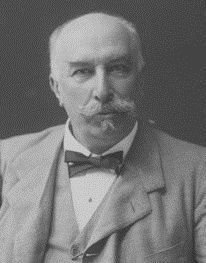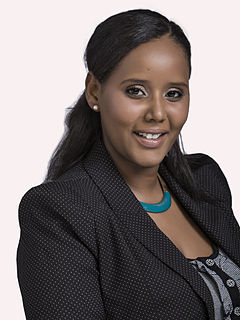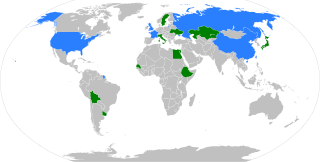Djibouti is a country in the Horn of Africa. It is bordered by Somalia to the southeast, Eritrea and the Red Sea to the north and northeast, Ethiopia to the west and south, and the Gulf of Aden to the east.

The politics of Ethiopia arise from the way the government of Ethiopia is structured as well as socioeconomic factors. The country's government is structured as a federal parliamentary republic with both a President and Prime Minister.

Addis Ababa is the capital and largest city of Ethiopia. According to the 2007 census, the city has a population of 2,739,551 inhabitants.

Ethiopia is a federal state subdivided into ethno-linguistically based regional states and chartered cities. This system of administrative regions replaced the provinces of Ethiopia in 1992 under the Transitional Government of Ethiopia and was formalised in 1995 when the current Constitution of Ethiopia came into force.

The Somali Regional State, is the largest and easternmost of the nine ethnic divisions (kilimo) of Ethiopia. The state borders the Ethiopian states of Afar, the chartered city Dire Dawa, Oromia to the west, as well as Djibouti to the north, Somalia to the north, east, and south, and Kenya to the south-west.

At the federal level, Ethiopia elects a legislature. The Federal Parliamentary Assembly has two chambers: the Council of People's Representatives with not more than 550 members as per the constitution but actually nearly 547 members, elected for five-year terms in single-seat constituencies; and the Council of the Federation with 117 members, one each from the 22 minority nationalities, and one from each professional sector of its remaining nationalities, designated by the regional councils, which may elect them themselves or through popular elections.

The People's Democratic Republic of Ethiopia (PDRE) was a communist state that existed in Ethiopia from 1987 to 1991.

Ethiopia held general elections on May 15, 2005, for seats in both its national House of Peoples' Representatives and in four regional government councils. Under pressure from the international community, Prime Minister Meles Zenawi promised that this election would be proof that more democracy would come in this multi-ethnic nation; international elections observers from the European Union (EU) and the U.S.-based Carter Center were present to observe the results. This election succeeded in attracting about 90% of the registered voters to the polls. A government ban on protests was imposed throughout the election period.
The Coalition for Unity and Democracy, commonly referred to by its English abbreviation CUD, or occasionally CDU; its Amharic abbreviation, used in Ethiopia, is Qinijit, in English writing often referred to as Kinijit) is a coalition of four existing political parties of Ethiopia which combined to compete for seats in the Ethiopian General Elections held on May 15, 2005. Its leader was Dr. Hailu Shawul.

The Ethiopian Democratic Party is a political party in Ethiopia. The result of no less than five mergers of liberal and conservative liberal opposition parties, it can trace its roots to the Ethiopian Democratic Union, which mounted armed monarchist resistance to the Derg in the immediate aftermath of the overthrow of Haile Selassie I. In the legislative elections held on 15 May 2005, the United Ethiopian Democratic Party - Medhin, as it was then known, was part of the United Ethiopian Democratic Forces, that won 52 out of 527 seats in the Council of People's Representatives. It won no seats in the 2010 elections.

The current Constitution of Ethiopia, which is the supreme law of the Federal Democratic Republic of Ethiopia, came into force on 21 August 1995. The constitution was drawn up by the Constituent Assembly that was elected in June 1994. It was adopted by the Transitional Government of Ethiopia in December 1994 and came into force following the general election held in May–June 1995.

A parliamentary election was held in Ethiopia on May 23, 2010.

Ethiopia held nationwide elections for local offices in the kebele and woreda assemblies on 13 and 20 April 2008. By-elections were also held for seats in the Addis Ababa City Council, and in the national and regional parliaments that were vacant due to the Coalition for Unity and Democracy’s (CUD) refusal to participate at the same time. By law, the local elections were supposed to be held as part of the 2005 general elections, but due to the resulting unrest they were postponed.

The Transitional Government of Ethiopia (TGE) was established immediately after the Ethiopian People's Revolutionary Democratic Front (EPRDF) seized power from the Communist-led People's Democratic Republic of Ethiopia (PDRE) in 1991 and it continued until 1995, when it transitioned into the reconstituted Federal Democratic Republic of Ethiopia, which continues to this time. Meles Zenawi was the president and Tamrat Layne the prime minister of the Transitional Government.

General elections were held in Italy on 21 March 1897, with a second round of voting on 28 March. The "Ministerial" left-wing bloc, led by Giovanni Giolitti remained the largest in Parliament, winning 327 of the 508 seats.

Pnina Tamano-Shata is an Israeli lawyer, journalist, and politician. She is currently a member of the Knesset for Yesh Atid, and was the first Ethiopian-born woman to hold a Knesset seat.

The 2016 United Nations Security Council election was held on 28 June during the 70th session of the United Nations General Assembly, held at United Nations Headquarters in New York City. The elections were for five non-permanent seats on the UN Security Council for two-year mandates commencing on 1 January 2017. In accordance with the Security Council's rotation rules, whereby the ten non-permanent UNSC seats rotate among the various regional blocs into which UN member states traditionally divide themselves for voting and representation purposes, the five available seats were allocated as follows:
Parliamentary elections were held in Ethiopia on 24 May 2015 to elect officials to the House of Peoples' Representatives. Regional Assembly elections were also held on this date.

Avraham Neguise is an Israeli politician and activist for the Falash Mura community.














